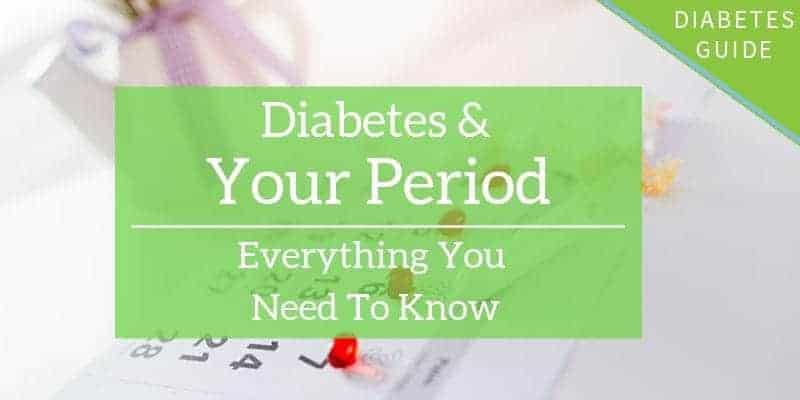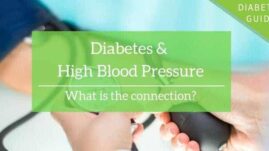Like so many other hormones produced by the human body, the fluctuating hormone levels of your menstruation cycle can have a significant impact on your blood sugars and your insulin needs.
Unfortunately, the reproductive-related hormones in the female body are much like a moving target. Throughout your 28-day cycle, your hormone levels are changing, making it difficult to predict when and by how much you may need to adjust your insulin doses to compensate.
In this article, we’ll cover everything you need to know in order to better manage your diabetes around your period.

Table of Contents
- Diabetes & your period
- There are 4 phases in the menstrual cycle and 4 major hormones impacting your diabetes
- The first day of your period will be the most challenging
- Your insulin needs should return to normal the day after your period starts
- During ovulation, your blood sugar and insulin resistance levels may rise
- You may be more insulin-resistant during the few days before your next period
- Use a period tracker app to help manage diabetes around your period
- Be patient — it’s nearly impossible to juggle your insulin needs around these hormones perfectly
Diabetes & your period
While managing your blood sugar levels around your menstrual cycle is never going to be an exact science, there are things you can do and be aware of that will make it much easier.
The key is to check your blood sugar often — especially in the days right before your period starts and during your period — to pinpoint when your insulin doses will need the biggest adjustments.
Let’s take a look at 8 aspects of menstruation to better manage your blood sugar levels during your period.
There are 4 phases in the menstrual cycle and 4 major hormones impacting your diabetes
“Even when you are not menstruating [bleeding] your body’s hormone levels are gradually changing daily as it prepares your body for the potential of pregnancy,” ” explains Jennifer C. Smith, RD and CDE, and co-author of Pregnancy with Type 1 Diabetes.
There are four phases that your body cycles through:
- Menstruation (days 1 through 10): This is the start of your 28-day (on average) monthly cycle when your period begins.
- Follicular phase (days 11 through 14): During this phase, your body is preparing for ovulation which is at the end of this 2-week period when your body releases an egg for the intention of becoming pregnant. If you are on birth control, your body will not release an egg.
- Ovulatory phase (days 15 to 20): This phase occurs at the mid-point of your entire menstrual cycle. The dominant follicle attached to your uterus triggers a large spike of luteinizing hormone. This hormone is actually produced by the brain. This phase shouldn’t have a significant impact on your blood sugar levels.
- Luteal phase (days 21 to 28): This phase is immediately after your body ovulates — which means it has released an egg and continues until the start of your period. The lining of your uterus will grow thicker during this phase in preparation for pregnancy. When you don’t become pregnant, that lining then sheds itself at the end of the Luteal phase which is, of course, what appears as blood and is the start of your period.
There are four hormones that regulate your entire menstrual cycle:
- Progesterone
- Estrogen
- Luteinizing Hormone (LH)
- Follicle Stimulating Hormone (FSH)
This includes if you are taking birth control because these fluctuating hormone levels play a critical role in managing your entire well-being.
All of these hormones raise your blood sugar by creating insulin resistance, not much different from the way other non-reproductive hormones like cortisol affect your blood sugars.
As a woman, you need these reproductive hormones for things as simple as managing your appetite, your heart rate, your skin, the amount of hair on your body, your sex drive, vaginal lubrication, and your body weight.
The first day of your period will be the most challenging
“Your 28-day cycle (although it can be longer for some people) starts with the start of your period,” explains Smith.
Most women will see a significant spike in their blood sugars on (or in the hours or day before) the start of their period. This is the result of increased hormone levels that enable your body to shed the lining of your uterine wall (which is what appears as “blood” during your period).
Smith says you may need to set a temporary basal rate with as much as 25 to 40 percent increase in insulin that day. For those taking long-acting insulin, you’ll need to increase your basal insulin dose the day of or night before your period by 25 to 40 percent.
For example, if you take 10 units of Lantus on a normal day, you would calculate 10 x 1.25 = 12.5. This means I would add 2.5 units to my long-acting insulin dose on the day of or the day before my period starts.
NOTE: Of course, work with your healthcare team whenever making new changes to your insulin dosing regimen.
The tricky part, of course, is that we’re not always positive when our period is going to start. And you don’t want to increase your basal insulin that significantly if your body doesn’t need it because it would result in low blood sugar.
If your period isn’t extremely consistent and reliable in terms of scheduling, you’ll likely need to wait until you experience typical symptoms (cramping, etc.) or until you actually see that you are bleeding before quickly increasing your doses.
Your insulin needs should return to normal the day after your period starts
“That insulin resistance should return to your normal after the first day of your period,” explains Smith, which means you can likely adjust your insulin doses back to your normal amounts.
The remainder of your actual period (when you are bleeding) should continue to be fairly insignificant in terms of blood sugar levels and insulin resistance.
During ovulation, your blood sugar and insulin resistance levels may rise
“The ovulatory cycle can definitely create some unpredictable high blood sugar levels and insulin resistance,” explains Smith.
When your body is preparing to release an egg approximately 14 to 16 days after the start of your last period, nearly all of your hormone levels rise quickly, creating a brief but significant spike in blood sugar levels.
Similar to the start of your period, you may need a 25 to 40 percent increase in your background insulin doses.
Fortunately, this cumbersome phase only lasts for as long as 2 to 3 days in most women. That being said, it’s still very hard to pinpoint and predict, which means you’ll need to keep a close eye on your menstruation calendar.
If you can match up your sudden high blood sugars with the days on the calendar during which your body is preparing for ovulation, you’ll feel far less frustrated with those seemingly irrational high blood sugars.
You may be more insulin-resistant during the few days before your next period
As your body prepares for your next period, you may notice a bit of insulin resistance during the last few days before it starts.
Some women may see insulin resistance during the entire week before the start of their period, and others may not notice any insulin resistance or stubborn high blood sugar levels at all.
Use a period tracker app to help manage diabetes around your period
There are so many free period tracking (or “period calendar”) apps these days. They all serve the same purpose: to help you pinpoint when your body is most likely ovulating and when your period is going to start.
Usually, a young or grown woman doesn’t need to track her ovulation and menstrual calendar this closely until she’s trying to get pregnant. For women with diabetes, it serves an entirely different purpose and can be very helpful.
The more consistently you use it, the more accurate the information will be which will help you anticipate those tedious blood sugar fluctuations, too.
Open your “Apps Store” application on your smartphone (or use Google for one to use on your computer), and choose any of the top few free results. It will likely assume your menstrual cycle is 28 days from start to finish (the start of your period until the day before your next period).
If you track your period consistently for 3 months, you can see if your body indeed follows a 28-day cycle or if it’s possibly a little longer. Then adjust the settings in the app (for example changing a 28-day cycle to a 30-day cycle).
If you notice your cycle is longer than 35 days, inform your healthcare team immediately as this can be a sign of other problems.
Be patient — it’s nearly impossible to juggle your insulin needs around these hormones perfectly
“Be patient,” Smith encourages. “If you can identify patterns in your blood sugar levels and insulin needs based on your menstrual calendar, that’s great. If not, do the best you can to react quickly when you do notice your blood sugars are more resistant and running higher.”
And of course, take good notes! If you increased your basal rate or long-acting insulin dose from 14 units to 18 units last month — and it worked well for your blood sugar goals — be sure to write that down so you can refer to it next month!
Managing diabetes is never easy and it’s never perfect. Take a deep breath, do the best you can, and never stop trying to learn more about your body’s needs as a person with diabetes.




Jade
should i be concerned if I’m having insulin resistance not only 5 days after my period ended? It seems i have resistance more than not lately and I’m wondering if this may be a hormone issue.
Christel Oerum
I would suggest you discuss it with your endocrinologist. A higher insulin resistance overall could also be due to activity level or your diet. But our bodies also have different insulin needs at different times in our lives, so you might be going through a transition period
Margaret
My 19 year old daughter is only three months out from her diagnosis. She had an A1C of >14 and bgl of 391 when she was diagnosed. Thankfully she never went into DKA. I brought her to my doctor on her Christmas break and demanded a plethora of test to get to the bottom of her extreme hair loss, hunger and thirst. Her periods were also very wonky. She was a 27-29 day cycle girl for much of her menstruating life, but since she had been put on the pill from Jan-June of 2019 (she went off because she was having a period every two weeks), her periods come every 20-23 days. She is now on the dex and omnipod and she has fairly good management of her numbers (still really tweaking it..although alone since the pandemic), her hair loss has slowed way down (although she still doesn’t have the super thick hair she did) and she feels better than she had up to the diagnosis (we think she was diabetic for about 7-9 months prior). Here’s my question…are having short cycles normal for diabetics? Or is her body still working itself out? She has also gained a lot of weight (she never lost weight…but was consuming she figures 4000+ calories a day leading up to diagnosis) even though she is eating EXTREMELY good and walking briskly for 30-60 mins daily. She is about 15 pounds heavier than she was a year ago. But she is about 25 pounds heavier than she should be. All of this is so frustrating! She just wants to feel like herself again. Maybe it’s too soon in this journey to be there…I don’t know. It’s just so hard to figure it all out.
Ginger Vieira
Hi there Mama Margaret!
Your frustration is valid! But I want to encourage you to let your daughter’s body adjust and rebalance. She’s only a few months into her diagnosis, and her healthcare team is still trying to adjust and fine-tune her insulin needs. A few notes:
1. If you don’t have a great endocrinology team in your area, I highly recommend working with Gary Scheiner / Jenny Smith via Skype at IntegratedDiabetesSErvices, and reading Gary’s book “Think Like a Pancreas.” They are the GOLD STANDARD of type 1 diabetes healthcare. Everyone on Gary’s team has Type 1. They can help ensure your daughter is getting the amount of insulin she actually needs VERSUS being prescribed too much insulin and thus having to eat more to “feed her insulin.” This can lead to weight gain and frustration. But I do think if she continues striving to improve her blood sugars, stay active, eat a diet of MOSTLY whole foods, her weight will eventually restabilize, too.
2. Her periods should normalize once she’s recovered from the stress on her body from months of 400 mg/dL BGS. When our bodies endure any type of stress, it easily throws menstrual cycles off. Give her body time to rebalance.
3. Take a deep breath. Type 1 diabetes is a life-long learning process. We never learn it all in one year or from one book, etc. It’s really a life of “Experiment + Adjust” rinse and repeat. The healthier her ongoing daily habits are, the sooner the most obvious signs of her health (like her weight) will rebalance, too.
I do want to caution you from over-emphasizing to her that insulin made her gain weight. Teenagers with T1D are at a much higher risk of developing eating disorders. A fear of insulin/weight-gain leads to a very dangerous eating disorder called “Diabulimia.” —> https://diabetesstrong.com/diabulimia-recovery/
Remind her that we ALL need insulin to survive, and her healthy habits will pay-off in time. Her body has just endured something very traumatic (the onset of T1D) and it takes time to recover from that trauma and rebalance everything affected in her body by that trauma.